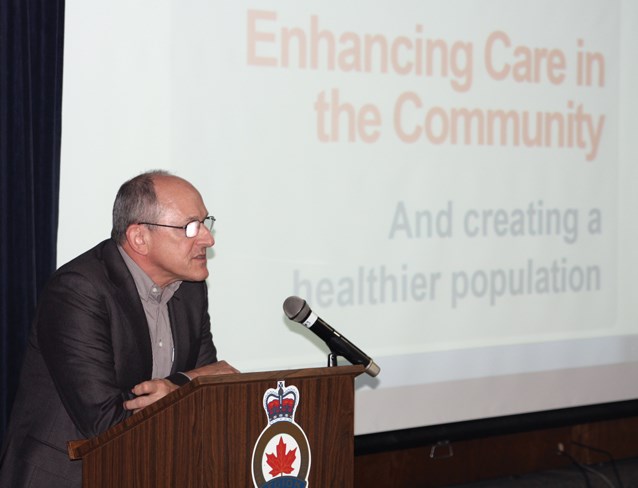The Calgary doctor who led the team that created the province’s framework for medically-assisted dying for Alberta Health Services (AHS) was in Westlock Friday to share his experience working on that task and to give an overview of the system he helped develop.
Dr. James Silvius was the keynote speaker at a May 25 public information session at Legion hosted by the Tamarack Health Advisory Council, whose purpose is to enhance and develop partnerships between AHS and the communities they represent including Westlock and Barrhead.
For his work on the file, Silvius was the recipient of the Canadian Medical Association’s 2017 Dr. William Marsden Award in Medical Ethics, which recognizes exemplary leadership, commitment and dedication to the cause of advancing and promoting excellence in the field of medical ethics in Canada.
“When we were doing this work, there were certain things we thought were rather critical. We had a recognition of the emotive nature of the issue right off the bat,” said Silvius, who, before accepting the job, insisted he be able to do it his way and that he be allowed to develop a system that respects everybody’s rights equally, including those who disagree with the practice.
“It’s perfectly fine to say medical assistance in dying is a constitutional right of Canadians, which is basically what the Supreme Court said, but equally, practitioners that have a conscientious objection have rights as well and I wanted to be sure that they were respected,” he said.
“If we don’t understand what drives an individual to either be an advocate, or to be somebody who says this will never happen, how are we possibly going to design a system that’s going to allow us to meet both sets of needs which are diametrically opposed?”
Silvius also chairs the medical assistance in dying review committee, which is tasked with ensuring that medically-assisted death is appropriately provided across the province.
One of the issues that tends to come up regularly is the role of faith-based institutions that do not condone medically-assisted dying.
Covenant Health, for instance, follows Catholic values and at one point did not even allow discussion of the subject in their facilities, said Silvius, but have slowly come around to allowing forms to be signed and assessments to be performed in their facilities.
“Over the last year and a half we have had a very significant transition in terms of the thinking of Covenant in what they are willing to do and not do.
“They have really come a very long way, because what they have realized is that just because an individual makes a request for information does not make them culpable in the ultimate death of that individual.
“We have actually now received some praise from a number of medical Christian organizations who said we got it right and I think that speaks to what it is we were trying to do in the first place and it makes me quite happy.”
The framework developed by Silvius and his team determined that to be eligible for a medically-assisted death in Alberta you must be at least 18 years of age and in a condition where “natural death has become reasonably foreseeable but the precise proximity to death is not required,” said Silvius.
The definition of “reasonably foreseeable” has been a source of disagreement among those in the health care field and the public since the legislation was passed.
“That is something that has generated a lot of debate and discussion across this country, because it requires clinical judgment and your concept of reasonably foreseeable and mine are probably different,” said Silvius.
The request must also be voluntary, you must provide informed consent, and you must be eligible for publicly funded health care services in Canada.
There are, of course, safeguards in place to make sure anyone requesting a medically assisted death meets eligibility requirements. Two independent doctors must agree a patient is eligible and if they disagree a third doctor is brought in to make the final decision.
There is a also a lot of consideration put into making sure vulnerable people are not deemed eligible for a medically assisted death, said Silvius, including individuals with diagnosed mental illnesses.
“We need to recognize that individuals may make a decision for an assisted death for a variety of reasons that are unrelated to their diagnosis or their prognosis, that they may not make under other circumstances. One of the reasons that the federal legislation precludes, or excludes individuals with a primary mental health diagnosis is because when people are more ill with their mental illness, they may make a choice they would not make if they were in a different frame of mind,” he said.
He said there are many causes of vulnerability whether they be financial, social, familial, or if doctors suspect they are being coerced.
As of April 30, 2018, there have been 364 medically-assisted deaths in Alberta.



